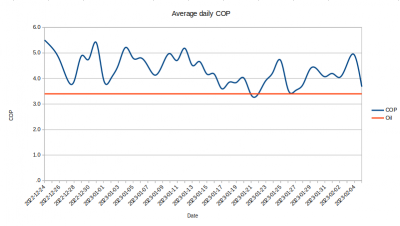The death of the ASHP?
With the pending rise in energy prices pushing the unit cost of electricity from 0.34p/kWh to anywhere between 0.40p and 0.48p/kWh, what is the limit that would see widespread use or adoption of ASHPs economically unviable?
Posted by: @abernyteWith the pending rise in energy prices pushing the unit cost of electricity from 0.34p/kWh to anywhere between 0.40p and 0.48p/kWh, what is the limit that would see widespread use or adoption of ASHPs economically unviable?
As long as electricity price is still pegged to the mains gas price, ASHPs are only really economically beneficial to those without mains gas, but at least while that link remains, they're not going to get any worse economically because as the electric unit cost increases, so does the gas cost.
But as many of us in rural areas are not on the mains gas grid, so then the choice is oil, lpg, logs or ASHP. The linked rising unit price of mains gas is therefore irrelevant. At some point those off mains grid are effectively economically denied access to running ASHP if the unit price of 'leccy becomes too high. Already I would argue we are near that point. An annual energy requirement of 25000 kWhs, which is not too excessive, is going to mean an annual bill of around £5,500 on the worst case scenario of 048p/kWh with oil costing £3,500. That gap is not sustainable.
Posted by: @abernyteBut as many of us in rural areas are not on the mains gas grid, so then the choice is oil, lpg, logs or ASHP. The linked rising unit price of mains gas is therefore irrelevant. At some point those off mains grid are effectively economically denied access to running ASHP if the unit price of 'leccy becomes too high.
LPG price is also linked to mains gas price, while ASHP beats Oil and logs so comfortably that it would need such a high electricity unit price that the government will never let it happen because so many people would go broke, no matter what they heat with.
Posted by: @abernyteAlready I would argue we are near that point. An annual energy requirement of 25000 kWhs, which is not too excessive
25000kWh is pretty excessive, as energy requirement and definitely as an electricity usage. After all, 15000kWh was the national average before the current crisis. If we look only at 5-bedroom houses, 20300kWh of energy is the average, with 4,300kWh of electricity and 16,000kWh of heat, which should be about 5,500kWh of electricity with a decent ASHP, so that's under 10,000kWh of electricity.
I humbly suggest that anyone with 25000kWh electricity usage probably doesn't have a 25000kWh requirement and should look at reducing usage, but there's not many. How many do you think there are?
Posted by: @abernyteBut as many of us in rural areas are not on the mains gas grid, so then the choice is oil, lpg, logs or ASHP. The linked rising unit price of mains gas is therefore irrelevant. At some point those off mains grid are effectively economically denied access to running ASHP if the unit price of 'leccy becomes too high. Already I would argue we are near that point. An annual energy requirement of 25000 kWhs, which is not too excessive, is going to mean an annual bill of around £5,500 on the worst case scenario of 048p/kWh with oil costing £3,500. That gap is not sustainable.
Whilst the cost of electricity has gone up by a factor of 3, the price of mains gas is now 5 times higher. I think that oil is one of the cheapest options at the moment, but may not be in the future.
To help keep your energy bills in check you should concentrate both on improved insulation and ensuring that your heat pump is operating at optimal efficiency.
which should be about 5,500kWh of electricity with a decent ASHP,Posted by: @mjr
Okay, with a ASHP with a SCOP of 2.5 that still leaves a bill of around £2600. Heat with an oil boiler and that is sub £1,800 with around 6000kWh for heating.
My point is the danger in such a built in disadvantage to change will prevent uptake of clean renewable heating. Look at this and other similar fora and see the number of dissatisfied ASHP users where it turns out that the Heat pump is actually performing as expected but it is the concomitant bill attached to using it that causes the problem.
@derek-m, bang on Derek. I've just done the maths this weekend – based on our consumption with oil at 75p/litre (that's our oil club price this weekend) and electricity at 34p/kWh if temperatures are above 5C our ASHP is about 20% cheaper to run than oil. As temperatures go up (over 5C in our case) ASHPs will continue to be cheaper to run.
Get a copy of The Ultimate Guide to Heat Pumps
Subscribe and follow our YouTube channel!
Posted by: @editorI've just done the maths this weekend – based on our consumption with oil at 75p/litre (that's our oil club price this weekend) and electricity at 34p/kWh if temperatures are above 5C our ASHP is about 20% cheaper to run than oil. As temperatures go up (over 5C in our case) ASHPs will continue to be cheaper to run.
That is surprising and welcome. Oil at 75p/litre seems very keen, Boiler Juice are quoting 84p/litre today. How many litres of oil v how many kWhs of 'leccy was that nominal calculation using (without prying to deeply into your domestic energy consumption!). I understood that 1 litre of kerosene gives 10.3 kWh of energy so the ASHP COP will have to be 3.3 to break even at 0.34p/kWh for 'leccy, or have I missed something?
Posted by: @mjrwhile ASHP beats Oil and logs so comfortably
I don't think so, at least for oil, don't know about logs. Assume:
cost of electricity = 34p per kWh used, COP of 3.5 => cost per delivered kWh = 9.7p (plus standing charge) (plus it's going to get a LOT worse)
cost of oil (RBO/kerosene) = 80p per litre (today's boilerjuice.com price for England), 10.35kWh in a litre, kWh yield at 80% boiler efficiency = 10.35 * 0.8 = 8.28 kWh => cost per delivered kWh = 9.7p (plus oil price is currently trending downwards)
After adding in the electricity standing charge, oil is the cheaper option.
ASHPs are also vastly more expensive to install, and probably cost a lot more to maintain, because you have to have 'pro' servicing to maintain your warranty.
Posted by: @mjr25000kWh is pretty excessive, as energy requirement
I think maybe you have forgotten about all those old leaky buildings out there, many of them listed, so plastering them with insulation or for that matter solar panels is not an option (nor would I want to do it, the character of listed buildings is too precious; I would rather accept higher bills as the cost of keeping the character of the building). But the higher costs need to be within the bounds of reasonableness, if (when?) governments start acting unreasonably eg by allowing runaway fuel price inflation without limit, then the people start to get unreasonable.
Posted by: @editorif temperatures are above 5C our ASHP is about 20% cheaper to run than oil.
Mars, far be it for me to question The Master, but are you sure? See my above calcs (unless you've got an Aga, in which case you might as well use bank notes as the fuel).
Midea 14kW (for now...) ASHP heating both building and DHW
Posted by: @abernyteOkay, with a ASHP with a SCOP of 2.5
Look, if you hate heat pumps, just say so. Please don't make up comparisons using the sort of SCOPs generally seen with defective units or botched installations.
My installation has faults that I've not yet resolved, as well as some that I have (but not before they cost a packet) and it still had a first-year SCOP over 3.2.
Posted by: @abernyteMy point is the danger in such a built in disadvantage to change will prevent uptake of clean renewable heating.
I'd agree that the increasing electricity price will slow uptake, but it's nowhere near as bleak as these comparisons suggest.
Posted by: @abernyteLook at this and other similar fora and see the number of dissatisfied ASHP users where it turns out that the Heat pump is actually performing as expected but it is the concomitant bill attached to using it that causes the problem.
I think pretty much every dissatisfied user I've seen has had an ASHP that isn't working as expected.
Posted by: @cathoderayAfter adding in the electricity standing charge, oil is the cheaper option.
That seems an unfair comparison because how many oil boilers aren't connected to mains electricity which therefore requires payment of the standing charge?
Posted by: @cathoderayASHPs are also vastly more expensive to install, and probably cost a lot more to maintain, because you have to have 'pro' servicing to maintain your warranty.
I agree on the expense if you can't get the market-distorting grant, but warranty-continuing servicing seems about the same price. I know some on here are paying mid/high three figures to their original installer for their approved servicing, but I don't (not least because the installer is playing possum).
Posted by: @cathoderayI think maybe you have forgotten about all those old leaky buildings out there, many of them listed
If someone is going to take on a listed building and do nothing to improve its energy efficiency, they'll need deep pockets no matter what the heating. The energy usage will be excessive and that's such a niche group that it's barely going to move the needle on the average, which, just to repeat, is 15000 kWh not 25000. No-one should be making energy policy or generalisations based on such a tiny niche.
Posted by: @abernytewhat is the limit that would see widespread use or adoption of ASHPs economically unviable?
This should give you an idea. I think if you get a CoP of 3.9 or higher you are cheaper than oil, though depends on your price of electricity.
https://nottenergy.com/resources/energy-cost-comparison/
This is my CoP vs oil - including hot water - based on average of 33p per kWh, at that price you need to get CoP of 3.4. [Excludes standing charge - but I would pay that anyway to run the pumps if I had oil, so I have not included it, it is common to both]
Posted by: @cathoderayAfter adding in the electricity standing charge, oil is the cheaper option.
If someone has an oil boiler that does not need electricity and is thus exempt from the standing charge let me know 😀. I excluded it as this is a tax everyone on the grid has to pay afaik.
- 27 Forums
- 2,495 Topics
- 57.8 K Posts
- 451 Online
- 6,220 Members
Join Us!
Worth Watching
Latest Posts
-

Below is a better quality image. Does that contain all ...
By trebor12345 , 4 minutes ago
-
Sorry to bounce your thread. To put to bed some concern...
By L8Again , 6 minutes ago
-

@painter26 — they (the analogue gauges) are subtly diff...
By cathodeRay , 40 minutes ago
-

RE: What determines the SOC of a battery?
The answer from Fogstar was crisp. My hypothesis, su...
By Batpred , 1 hour ago
-

RE: Electricity price predictions
I am always impressed with how you keep abreast of so m...
By Batpred , 1 hour ago
-

RE: Setback savings - fact or fiction?
I fully understand your reasoning, same steady inputs s...
By cathodeRay , 1 hour ago
-
RE: Humidity, or lack thereof... is my heat pump making rooms drier?
@majordennisbloodnok I’m glad I posted this. There see...
By AndrewJ , 2 hours ago
-
RE: Testing new controls/monitoring for Midea Clone ASHP
@tasos and @cathoderay thanks. I have some history grap...
By benson , 4 hours ago
-
Our Experience installing a heat pump into a Grade 2 Listed stone house
First want to thank everybody who has contributed to th...
By Travellingwave , 4 hours ago
-

RE: Solis inverters S6-EH1P: pros and cons and battery options
Just to wrap this up here for future readers: The S...
By Batpred , 7 hours ago
-
RE: Struggling to get CoP above 3 with 6 kw Ecodan ASHP
Welcome to the forums.I assume that you're getting the ...
By Sheriff Fatman , 7 hours ago
-
RE: Say hello and introduce yourself
@editor @kev1964-irl This discussion might be best had ...
By GC61 , 9 hours ago
-

RE: Oversized 10.5kW Grant Aerona Heat Pump on Microbore Pipes and Undersized Rads
@uknick TBH if I were taking the floor up ...
By JamesPa , 23 hours ago
-

RE: Getting ready for export with a BESS
I would have not got it if it was that tight
By Batpred , 1 day ago
-
RE: Need help maximising COP of 3.5kW Valiant Aerotherm heat pump
@judith thanks Judith. Confirmation appreciated. The ...
By DavidB , 1 day ago
-

RE: Recommended home battery inverters + regulatory matters - help requested
That makes sense. I thought better to comment in this t...
By Batpred , 1 day ago
-
Bosch CS5800i 7kW replacing Greenstar Junior 28i
My heat pump journey began a couple of years ago when I...
By Slartibartfast , 1 day ago
-

RE: How to control DHW with Honeywell EvoHome on Trianco ActiveAir 5 kW ASHP
The last photo is defrost for sure (or cooling, but pre...
By JamesPa , 1 day ago
-

RE: Plug and play solar. Thoughts?
Essentially, this just needed legislation. In Germany t...
By Batpred , 1 day ago
-
RE: A Smarter Smart Controller from Homely?
@toodles Intentional opening of any warranty “can of wo...
By Papahuhu , 1 day ago
-
RE: Safety update; RCBOs supplying inverters or storage batteries
Thanks @transparent Thankyou for your advic...
By Bash , 1 day ago
-
RE: Air source heat pump roll call – what heat pump brand and model do you have?
Forum Handle: Odd_LionManufacturer: SamsungModel: Samsu...
By Odd_Lion , 1 day ago
-
RE: Configuring third party dongle for Ecodan local control
Well, it was mentioned before in the early pos...
By F1p , 2 days ago





